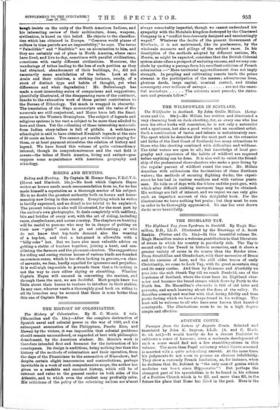THE HISTORY OF COLONISATION.
The History of Colonisation. By H. C. Morris. 2 vols. (Macmillan and Co. 15s.)—After the complete destruction of Spanish naval and colonial power in the war of 1893, and the subsequent annexation of the Philippines, Puerto Rico, and Hawaii by the victors, it was impossible that colonial problems should remain unconsidered, or regarded at best with philosophic detachment, by the American student. Mr. Morris's work is therefore intended first and foremost for the instruction of his countrymen. Its design is ambitious, being nothing less than the history of the methods of colonisation and their operation, from the days of the Phcenicians to the annexation of Kiao-chow; bat despite certain slight inaccuracies and contradictions, perhaps inevitable in a work of such comprehensive scope, the author has given us a readable and succinct history, which will be of interest and value to the general reader on both sides of the Atlantic, and to which even the student may profitably refer. His criticisms of the policy of the colomis:ng nations are almost
always remarkably impartial, though we cannot understand his sympathy with the Matabele kingdom destroyed by the Chartered Company in a "conflict treacherously designed and unrelentingly waged." Whatever the faults of the present Government of Rhodesia, it is not maintained, like its predecessor, by the wholesale massacre and pillage of the subject races. In his description of the methods adopted by different nations, Mr. Morris, as might be expected, considers that the British Colonial system alone offers a prospect of enduring success, and we may con- clude by quoting a passage from his excellent criticism of French colonisation :—" Mere territorial aggrandisement does not imply strength. In peopling and cultivating remote lands the prime element is the participation of the masses ; adventurous lives, glorious deeds, large capital, nominal control, and titular sovereignty over-millions of savages are not the essen- tial mainstays The colonists must precede, the states- men and generals follow."




















































 Previous page
Previous page